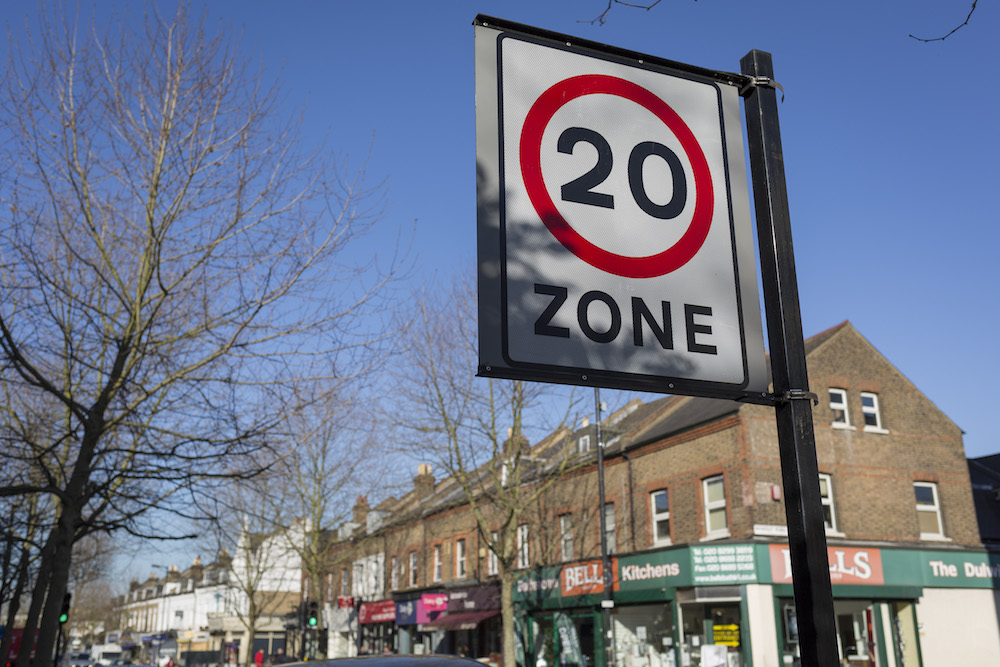20mph speed limits lead to increase in cycling, according to government report
But the study didn’t find enough evidence on reducing crashes and injuries

The government has commissioned research into 20mph speed limits (Photo by Richard Baker / In Pictures via Getty Images)

Reducing speed limits to 20mph leads to a “small but statistically significant improvement” in cycling, according to a government report.
Research by the Department for Transport (DfT) found that the number of people cycling and walking has increased in areas where lower speed limits were introduced.
But the DfT commissioned research didn’t find enough evidence to reach a conclusion on whether these schemes reduce crashes or injuries.
>>> ‘Traffic-dominated roundabout’ will be completely transformed to make it safer for cyclists
Cycling and walking minister Jesse Norman said: “Overall, the introduction of 20mph speed limits led to a small reduction in median speed (less than 1mph), but vehicles travelling at higher speeds before the change of speed limit reduced their speed more than those already travelling at lower speeds.
“The study found insufficient evidence to conclude that in residential areas the introduction of 20mph limits had led to a significant change in collisions and casualties.
“Overall, there was a small but statistically significant improvement in reported levels of cycling and walking.
Get The Leadout Newsletter
The latest race content, interviews, features, reviews and expert buying guides, direct to your inbox!
“Important benefits of 20mph schemes include quality of life and community benefits, and encouragement of healthier and more sustainable transport modes such as walking and cycling.”
The study, which was published on Thursday, used case studies from 12 locations across the UK – Walsall, Nottingham, Brighton, Middlesbrough, Calderdale, Portsmouth, Chichester, and two areas from Liverpool, Brighton and Winchester.
More than 2,000 residents were interviewed, as well as 1,256 drivers, 1,655 cyclists and 352 motorcyclists.
Research shows that 47 per cent of drivers complied with the lower limits in residential areas and 65 per cent in city centres.
>>> Lowering speed limits should be government priority, according to cycling campaigners
The majority of those breaking the speed limit were travelling at less than 24mph, according to the study – a “significant reduction in speed.”
Most people supported the 20mph limits after they were introduced – 81 per cent of cyclists approved along with 75 per cent of residents and 55 per cent of non-resident drivers.
After the lower limits were introduced, five per cent of people said they were walking more while two per cent said they are cycling more.
Director of communications at Road Safety GB, Steve Horton, said: “Whilst there may be many unanswered questions, the initial findings confirm a primary benefit of 20mph limits is in the creation of an environment where more people feel prepared to walk or cycle.
“A key, as yet unanswered, general question is around the direct casualty reduction benefits of such lower speed areas.
“As is the case with many road safety interventions, we rely on other indicators to extrapolate lower casualties or lower severity - in this case, it’s a measurable reduction in mean speeds as well as the general acceptance from most drivers as to the concept of 20mph limits.”

Thank you for reading 20 articles this month* Join now for unlimited access
Enjoy your first month for just £1 / $1 / €1
*Read 5 free articles per month without a subscription

Join now for unlimited access
Try first month for just £1 / $1 / €1
Alex Ballinger is editor of BikeBiz magazine, the leading publication for the UK cycle industry, and is the former digital news editor for CyclingWeekly.com. After gaining experience in local newsrooms, national newspapers and in digital journalism, Alex found his calling in cycling, first as a reporter, then as news editor responsible for Cycling Weekly's online news output, and now as the editor of BikeBiz. Since pro cycling first captured his heart during the 2010 Tour de France (specifically the Contador-Schleck battle) Alex covered three Tours de France, multiple editions of the Tour of Britain, and the World Championships, while both writing and video presenting for Cycling Weekly. He also specialises in fitness writing, often throwing himself into the deep end to help readers improve their own power numbers. Away from the desk, Alex can be found racing time trials, riding BMX and mountain bikes, or exploring off-road on his gravel bike. He’s also an avid gamer, and can usually be found buried in an eclectic selection of books.
-
 Full Tour of Britain Women route announced, taking place from North Yorkshire to Glasgow
Full Tour of Britain Women route announced, taking place from North Yorkshire to GlasgowBritish Cycling's Women's WorldTour four-stage race will take place in northern England and Scotland
By Tom Thewlis
-
 Positive signs for UK bike industry as Halfords cycling sales grow
Positive signs for UK bike industry as Halfords cycling sales growRetailer admits that the impact of Donald Trump's tariffs remains to be seen
By Tom Thewlis